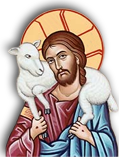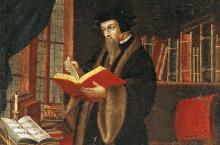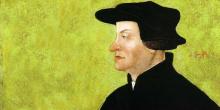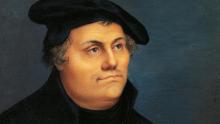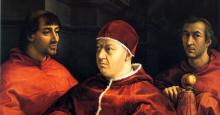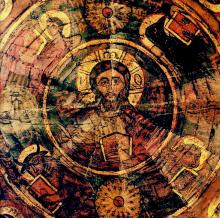Blog Tag: Christian History
You are here
How Zwingli’s radicalism shaped Evangelical worship
The radical gap between modern evangelical worship and traditional Christian worship is in large part the result of the influence of the sixteenth century Swiss Reformer, Ulrich Zwingli. Zwingli was a contemporary of Martin Luther, and if Martin Luther wanted reform in the Church, Zwingli wanted to restore the Church from scratch. To illustrate just how radical have been the consequences of Zwingli’s teaching, let’s compare a typical evangelical worship service with a traditional Christian worship service.
How Martin Luther’s protest failed him
It is deeply satisfying to see the peace, love and joy that flows into the hearts of worshipers here at The Good Shepherd. The work and fruit of the Holy Spirit is a deep, abiding, joyful stability which I see growing in many of our parishioners. Through entering into the worship of the Holy Orthodox Church, so many people, of Protestant, Catholic and Orthodox backgrounds alike, find communion with the God Who is the Lover of Mankind.
How Rome gave birth to Protestantism
Five hundred years ago this month, Martin Luther posted an invitation to an academic disputation on the door of the All Saints’ Church in Wittenberg. This act sparked a fire of protest that raged across Europe and caused a grievous schism in Catholic Europe that has never been healed. The soil that gave rise to the protest was a uniquely Latin, Roman Catholic one. The questions of dogma, doctrine and state politics were questions that arose from conditions unique to the West.
A history of Antiochian Orthodoxy in Australia, New Zealand and the Philippines
The history of the Antiochian Orthodox Archdiocese of Australia, New Zealand and the Philippines begins with the immigration of Orthodox Christians from Greece, Russia, Lebanon and Syria in the last years of the 19th Century. The first wave of Lebanese immigration was in the 1880–90s. Immigrants found work hawking and peddling goods in the country areas of eastern Australia and in Dunedin. Along with Greek and Russian Orthodox faithful, they took part in the construction of community churches — Holy Trinity Church in Surry Hills, Sydney; and Holy Annunciation, East Melbourne.
How old is the Orthodox Church?
How old is your church? Which church is the oldest Christain church? Let's find out.
History of the Antiochian Orthodox Church
The church of Antioch is the most ancient church after that of Jerusalem. The city of Antioch is situated on the eastern shore of the Mediterranean near the mouth of the Orontes River in northwestern Syria. Let’s learn about: the history of the Antiochian Orthodox Church, how the Antiochian Church was established and became a major centre for Christians, the persecution and decline of the Antiochian Church, and what can be found in Antioch today.
The Fall of Constantinople — 29th May 1453
The ancient city of Byzantium, later renamed Constantinople, today known as Istanbul in Turkey, was dedicated by the Roman Emperor Constantine the Great as the new capital of the Roman Empire in 330 AD and functioned as the centre of the East Roman (or Byzantine) Empire for over 1000 years. Let’s learn about what Constantinople was like and how the city fell.
The Seven Ecumenical Councils
The Greek word oikoumene means “the whole world,” and is the origin of the English word ecumenical. The seven ecumenical councils under discussion were assemblies consisting of bishops from all round the world. Their decisions at these councils on doctrine, cults and discipline were considered binding on all Christians. Let's learn some more about the Seven Ecumenical Councils.
Orthodox Church History
The word Orthodox means “conforming to established doctrine,” so Orthodox Christianity indicates “original Christianity” — Christianity in its pristine form and the fullness of Christian truth. It was the faith of the Apostles, which they took to the entire world in obedience to Christ’s command. Let’s learn some more about the Orthodox Church’s history and what makes it different from the Roman Catholic Church.

